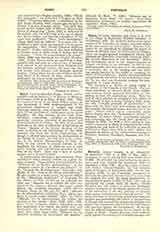

Binius, SEVERIN, historian and critic, b. in 1573 in the village of Randerath, Western Germany; d. February 14, 1641. He made his studies at the gymnasium of St. Lawrence, in Cologne, and later taught in the same school for several years. After his ordination to the priesthood he obtained the degree of Doctor of Divinity from the University of Cologne, where he taught general ecclesiastical history and ecclesiastical discipline, eventually becoming (1627-30) Rector Magnificus of the university. Binius was successively canon in two chapter-churches of Cologne and finally in the cathedral. In 1631 he was made counsellor and vicar-general of the archdiocese, a promotion due to his learning and one which was amply justified by his ability in managing the affairs of the archdiocese. Besides his many ordinary occupations he was active in the ecclesiastical minis-try; he was also very charitable towards the poor, especially to needy students.
The reputation of Binius is owing chiefly to his edition of the Councils of the Church. The previous collections by Jacques Merlin, Peter Crabbe, and Lorenzo Surius appeared incomplete to him, lacking as they did explanatory notes. With the help of other scholars he prepared a new edition of the councils in four volumes (Cologne, 1606) under the title “Concilia generalia et provincialia”. It gives only the Latin text, and contains the acts of the councils, the decretal letters, and the lives of the popes. Binius added copious explanatory notes, drawn largely from the “Ecclesiastical Annals” of Baronius. A second edition, considerably enlarged and containing also the Greek text, appeared at Cologne in 1618. In 1639 a third edition in nine volumes appeared at Paris, in preparation for which extensive use was made of the collection of councils published at Rome from 1608 to 1612. Binius also prepared an edition of the ecclesiastical histories of Eusebius, Socrates, Theodoret, Sozomen, and Evagrius.
FRANCIS J. SCHAEFER

